Sound: 









Value: 









(Read about our ratings)
Measurements can be found by clicking this link.
As I look back on my dozen or so years of reviewing headphones, the 2012 entry of PSB Speakers into the headphone market marks one of the most important new products I’ve tested. When PSB founder Paul Barton designed his first set of headphones, the M4U 2s, he applied much of the knowledge he’d gained in decades of work measuring and designing his speakers at Canada’s National Research Council in Ottawa (where the speaker measurements SoundStage! publishes are performed). The result was a set of headphones that sounded a lot like hearing real speakers in a good listening room. But it’s been a while since PSB introduced a new headphone model. I was starting to wonder if PSB, like so many other speaker companies, had bailed out of the headphone biz—but now along come the M4U 8 MKII Bluetooth noise-canceling headphones.
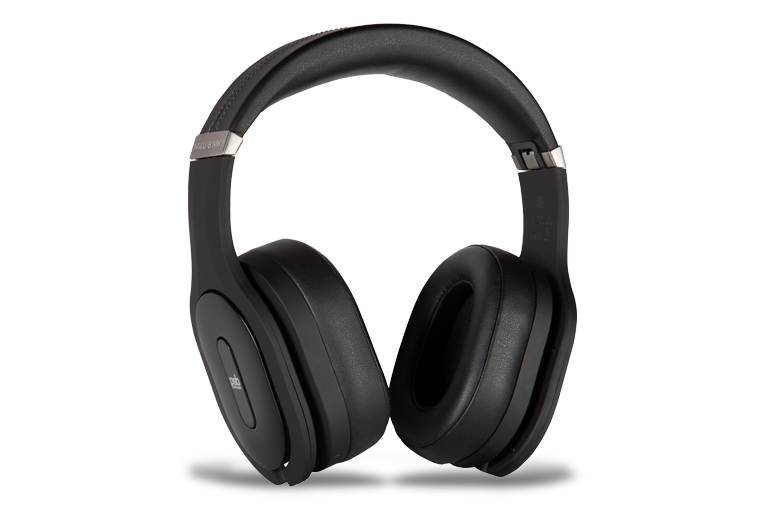
The M4U 8 MKII headphones ($399, all prices USD) are an updated version of the original M4U 8 model, introduced in 2019. The flashiest new addition is that the headphones are now controlled by an app, which includes Audiodo Personal Sound. Audiodo guides you through a hearing test and then uses the results to compensate for any flaws in your hearing. The technology is incorporated into the Bluetooth chipset so the tones for the test can be generated inside the headphones, rather than generating them from the app and transmitting through Bluetooth, which gives Audiodo precise control over volume. In addition to the M4U 8 MKIIs, Audiodo is also found in headphones and earphones from Skullcandy, Nocs Design, and Fresh ’n Rebel.
The new model looks the same as the original M4U 8s, but there are lots of internal changes. PSB says the headphones now have an all-digital signal path, “cutting down the number of conversion steps required in the audio chain to keep it clean and noise-free”—which I assume means reducing digital-to-analog and analog-to-digital conversions. They’ve also increased the battery life, claiming up to 50 percent more runtime, and switched from Micro-USB to USB-C for the charging jack.
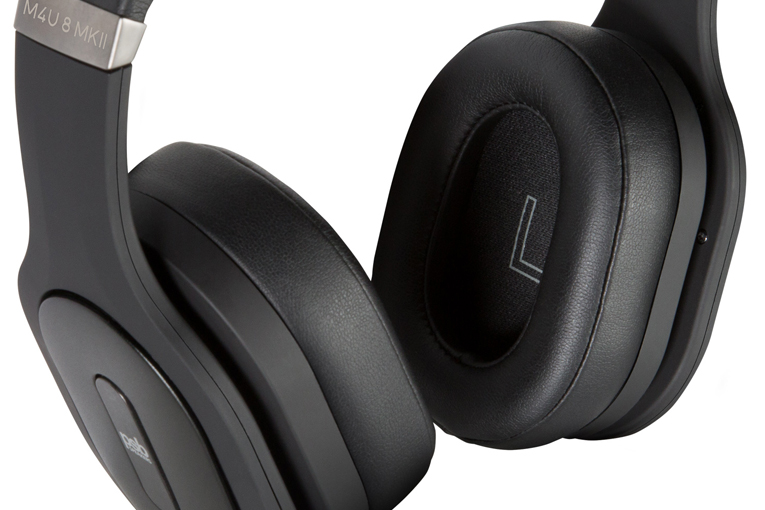
PSB rates the M4U 8 MKII headphones at 38 ohms nominal impedance, and 99.8dB sensitivity with a 1mW signal. They include the aptX HD and AAC codecs in addition to standard SBC.
In the box
The M4U 8 MKII headphones include a semi-hardshell carrying case, a USB-A-to-USB-C charging cable, a 2m (6.5′) analog audio cable tipped with 3.5mm (1/8″) plugs on each end, a 3.5mm-to-6.3mm (1/4″) adapter, and a dual-mono adapter for use with in-flight entertainment systems.
Use
The M4U 8 MKIIs are more or less an over-ear design, but their slim earpieces and earpads mean the pads are likely to mash against your pinnae. The pads are very soft, but still, they got a little uncomfortable for me after about 45 minutes of listening.
PSB eschews the often-confusing swipe-type controls found on many noise-canceling headphones, instead using dedicated buttons for play / pause / track skip, volume control, and noise canceling on/off. I prefer this simple, old-fashioned design.
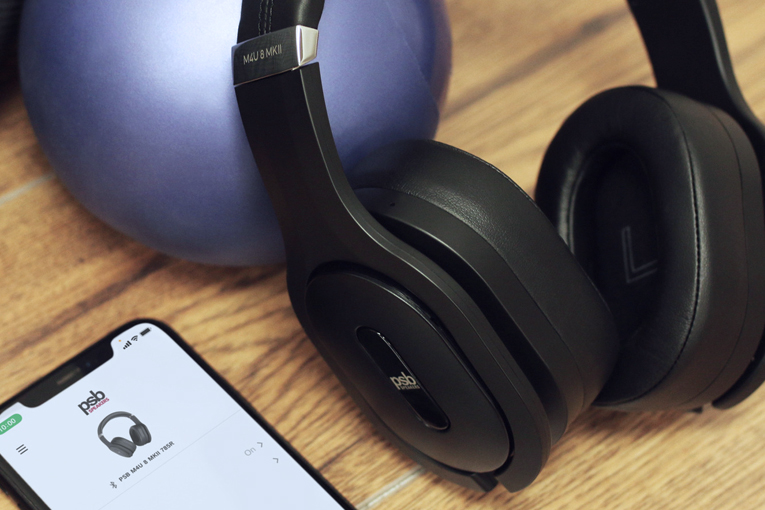
I found the Audiodo test unintuitive, and quite a bit different from most competing technologies. There’s a visual indicator that tells you when a tone is playing, which would seem to me to influence the result. You’re supposed to hit “yes” when you hear the tone and “no” when you don’t, but you don’t know exactly when you’re supposed to hit those buttons. I found myself getting inconsistent results when I took the test multiple times—it did figure out that my right ear needs little correction, but my high-frequency hearing in my left ear is deficient. My first run with Audiodo left the headphones sounding too bright. The second try turned out better and, according to the results chart, boosted the high frequencies less.
The noise canceling does an average job of canceling low-frequency noise of the type you’d encounter in an airplane cabin, but it also boosts high-frequency hiss to a noticeable degree. I think that’s because the noise canceling, in this case, inherently changes the tonal balance and boosts the treble—it did it even when I played pink noise from my phone through the headphones with noise canceling on. Check out the measurements section, available from the link at the top of this review, for more details.
Sound
Before I went through the Audiodo process, I thought the M4U 8 MKIIs sounded very good—maybe a tad soft in the upper treble, but with clear, well-defined bass and natural-sounding mids that suffered scant coloration. The correction introduced through Audiodo made an obvious difference, elevating the highs by a few dB and making the whole presentation more lively without adding harshness or edge, although it did emphasize sibilance sometimes. If you’re younger than me, and/or female, it’s likely you have better high-frequency hearing than I do, and Audiodo will make much less difference for you. In fact, a friend of mine who’s female and about 20 years younger (and with intact hearing, confirmed through a recent audiologist test) tried them, and her correction curve (which I tried) was still noticeable but much more subtle.
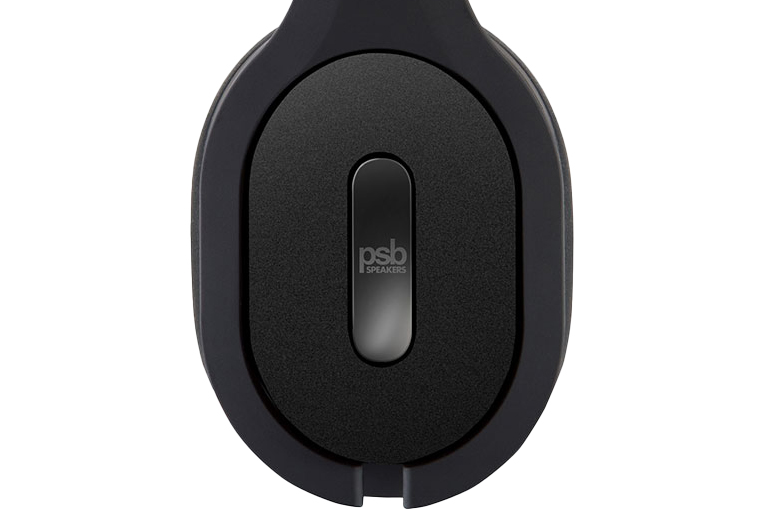
So for the rest of this review, I’ll talk about the sound with Audiodo, and assume that anyone who buys these headphones will buy them in part because of Audiodo, and will use the headphones with that feature activated. And most of my listening was with the noise canceling off, which I preferred. The fundamental sound quality of these headphones is very good, so I’m pretty confident that with or without Audiodo, you’ll get good sound.
I’d been casually messing around with the M4U 8 MKIIs for about a week before I gave them a serious listen. Those brief sessions inspired me to start my eval with a demanding, revealing cut: “Trouble Is a Man” from Patricia Barber’s Clique (24-bit/176.4kHz FLAC, Impex/Qobuz). But I listened to this tune several times in search of something I didn’t like about the sound. OK, there was a trace of sibilance, but it’s hard to find headphones that don’t have a bit of sibilance—especially when the music’s being piped through a Bluetooth connection.
Not only did the tonal balance seem spot-on when I played “Trouble Is a Man,” but the spatial presentation seemed just right for piano, double bass, drums, and a singer—neither diminished nor exaggerated. The bass sounded full and resonant yet detailed, and I loved the airiness I heard when the drummer delicately tapped on the ride and crash cymbals. Quite an impressive start.
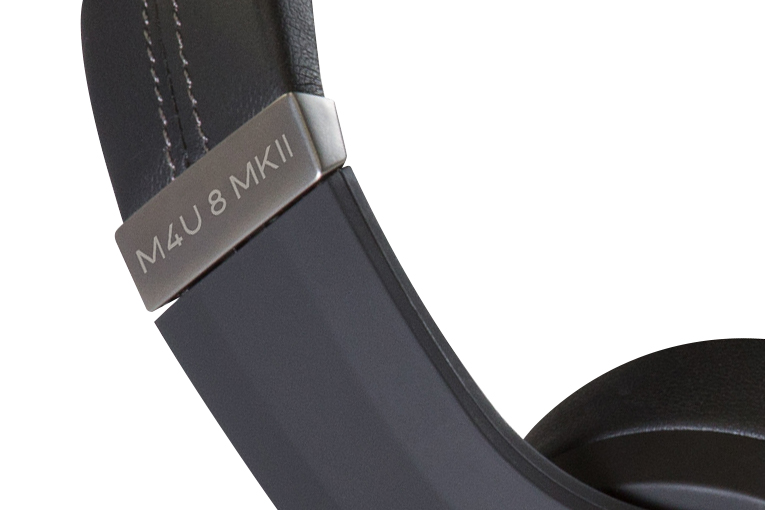
For something totally different, I put on the title track of Television’s Marquee Moon (24/192 FLAC, Rhino-Elektra/Qobuz). This is as straight-up a recording of a rock band as you can find—just two Fender guitars (a Stratocaster and a Jazzmaster, I think), a Fender Precision bass, a typical drum kit, a vocalist, and a bit of reverb. Through the M4U 8 MKIIs, absolutely nothing seemed amiss. The guitars sounded just like a couple of unfussy guitarists who set every knob on 5. The bass had that classic, clear mix of melodic and rhythmic drive found in so many new-wave records of that era. So many headphones would make the bass too boomy, or the guitars too edgy, or the cymbals too prominent, but the M4U 8 MKIIs just nailed it.
The M4U 8 MKIIs were just as kind to the orchestral material presented on Sibelius, with Klaus Mäkelä conducting the Oslo Philharmonic (24/96 FLAC, Decca/Qobuz). On the third movement, Scherzo. Allegro, of Sibelius’s Symphony No. 1 in E Minor, I did experience something pretty close to the sense of hearing a real orchestra in a good hall. None of the instruments—not just the strings, but even the bassoon and the harp—sounded colored or unnatural, and I loved the sense of space the M4U 8 MKIIs gave me. In ways, it seemed kind of perfect, with the instruments all easy to distinguish yet blending into a coherent whole. It sounded to me like the triple-forte peak around the five-minute mark might have been pushing the headphones to the limits of their dynamic capability—in other words, the bass thinned out slightly and made the cymbal crashes seem a bit harsh. But for Bluetooth noise-canceling headphones, that’s very good.
Since reading engineer/producer Ken Caillat’s Making Rumours, I’ve been on a Fleetwood Mac kick, so I put on “Dreams” from Rumours (24/96 FLAC, Rhino/Qobuz). This was a surprising presentation, indeed. The detail was incredible; I never noticed how layered this tune is. The headphones presented all the subtle little backing parts: the soft acoustic guitar strumming; the organ notes floating over the chorus like a string section; the chunky, Fender Rhodes chordal patterns deep in the mix; and the vibraphone backing the pre-chorus. The contributions of each backing vocalist were easy to pick out, too.
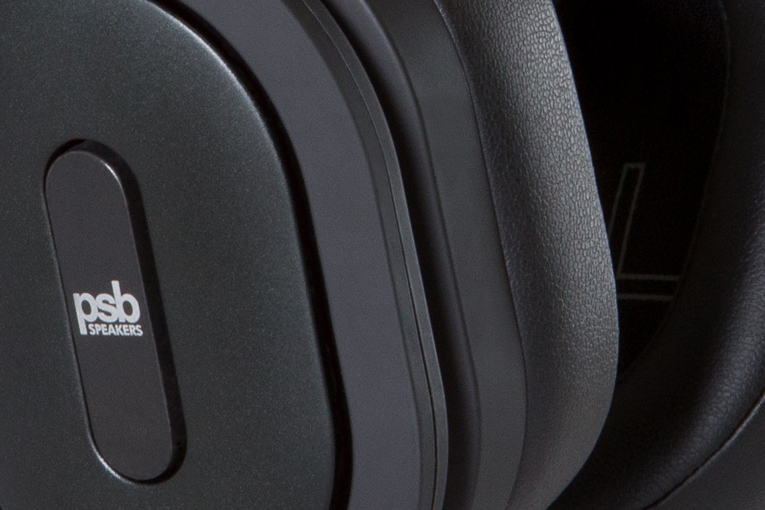
But most striking was the sense of groove I heard. I can’t recall ever hearing John McVie’s electric bass sounding so insistent, punchy, and in-the-pocket, and the drums seemed to lock in perfectly—especially when Mick Fleetwood brought in the powerful, thumping kick drum in the pre-chorus. With audio, I always seek a neutral, natural-sounding response, and generally consider any departure from that to be a flaw—but in this case, with the M4U 8 MKIIs, I felt that I was getting neutral and natural plus a welcome extra kick that the musicians would have appreciated.
Comparison
I compared the M4U 8 MKIIs mostly with the Bose QC45 headphones ($329), another Bluetooth design with noise canceling—the only other noise-canceling model I had on hand, unfortunately.
If noise canceling is a priority, the QC45s are in a whole different league than the M4U 8 MKIIs. From a sound-quality standpoint, it was a much closer contest. On the title track from Cécile McLorin Salvant’s Ghost Song album (24/96 FLAC, Nonesuch/Qobuz), the QC45s brought the vocals forward a bit in the mix, but also exhibited the somewhat mushy-sounding bass that’s been a characteristic of Bose’s basic design going back at least a decade.
In comparison, the M4U 8 MKIIs sounded less good with Audiodo off—the softened treble didn’t really do justice to this recording—but with Audiodo on, they sounded much more lively in the treble, bringing out the expression in the vocal a bit more and making it easier to distinguish the piano, electric guitar, vibes, and resonator guitar. They also reproduced the bass with better clarity and less boom. However, this was with noise canceling off; turning the noise canceling on added a bit of trebly glare to the vocals and emphasized the “stick click” on the cymbals. The better your high-frequency hearing is, the more you’ll likely notice this.
Conclusion
There are several things I don’t love about the M4U 8 MKII headphones: the too-small earpads that mash against my pinnae, the so-so noise canceling, the treble boost that kicks in when noise canceling is activated, and the rather bulky case, which is bigger than anything I’d want to carry on a plane. But there are two things I love about the M4U 8 MKIIs—the simple, intuitive controls and, most important by far, the sound.
. . . Brent Butterworth
Associated Equipment
- Smartphone: Samsung Galaxy S10.
PSB M4U 8 MKII Headphones
Price: $399.
Warranty: Two years, replacement.
PSB Speakers
633 Granite Court
Pickering, Ontario L1W 3K1
Canada
Phone: (905) 831-6555
Website: www.psbspeakers.com





